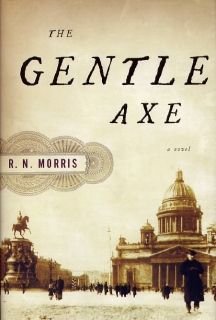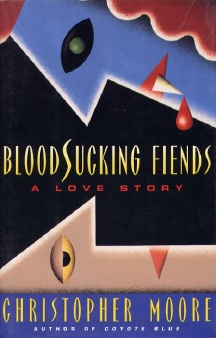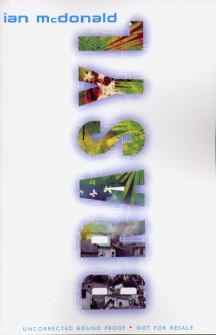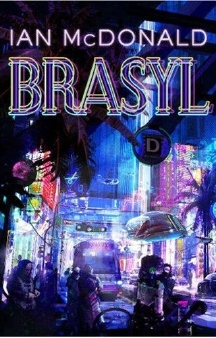Trashotron.com |
||
This Just In...News From The Agony Column
03-03-07: The Consequences of Fantasy
Preview for Podcast of Monday, March 5, 2007
Here's an MP3 preview of the Monday March 5, 2007 podcast for The Agony Column. Enjoy!
03-02-07: Doctor Daniel H. Wilson Wants to Know 'Where's My Jetpack?'
A Guide to the Amazing Science Fiction Future That Never Arrived
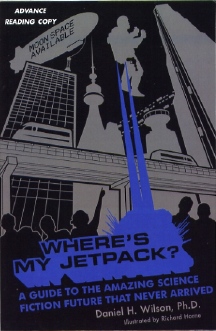
It's on your back, bro. Daniel H. Wilson, Ph.D. wants to know, everybody who reads this column wants to know, we all want to know about the jetpack. I spoke with Dr. Wilson a couple of years ago when he came through town to talk about his book 'How to Survive a Robot Uprising', a very odd little book that I really enjoyed, particularly because it was so hard to believe that such a book could get published. 'How to Survive A Robot Uprising' isn’t either science fact or science fiction, but a peculiar combination of pop culture observations, science fictional speculation and hard science, wrapped up in the sort of book you can read in a plane ride, after which it lands on your coffee table, even though it is rather diminutive for a coffee table book.
Well, publication wasn't the first surprise, however. It was after all, a really fun reading experience. But I have to say that even in the more odd science fiction futures I've read about and imagined, I couldn’t have foreseen 'How to Survive A Robot Uprising' being made into a movie by no less a man than Mike Meyers. It has a 2008 release date, and IMDB.com wants me to upgrade to IMBD Pro to even see any information about it. Harumph.
PLEASE UPDATE TO AGONY COLUMN PRO TO READ THE REMAINDER OF THIS ARTICLE.
Are you still with me? Good. While we contemplate the inevitable End of the World In Five Years, (maybe we can watch the DVD of 'How to Survive A Robot Uprising' while the world burns) we can spend our quality time reading 'Where's My Jetpack?: A Guide to the Amazing Science Fiction Future That Never Arrived' (Bloomsbury / Holzbrinck ; April 2007 ; $14.95). You should be pleased that it is the same design team who put together Wilson's first book at work here. The funky type, the goofy graphics, the retro-future look are all intact for your next descent into the future of the past. This is not a subject that is new to either science fiction readers or writers. The academic version is available in 'Archaeologies of the Future' by Frederic Jameson (sort of). Wilson's version follows the format and fun level of his 'How to Survive A Robot Uprising'; he divvies up the world into themed categories, and then cherry picks the most entertaining and desirable elements of the future we have failed to achieve. The list is friggin' endless, I mean think of it. We should be well past the world of 2001 now, with space travel for the moderately well-to-do, exciting missions to other planets, colonies on the moon...Instead, the entire globe is essentially in the condition that one might have expected of a third world backwater in Clarke's and Kubrick's vision. We shoot for the stars then we land in the toilet. Sheesh.
At least you can get a few grins out of the grim with Wilson's book. He starts with a section on Advanced Transportation, and the answer to your question is yes, on page 43. That's where he talks about the actual history of the flying car, from Henry Ford's unfortunate experiments to the Moller Skycar. But you can imagine what the drunk skycar drivers will do, can't you? Hell, it makes the whole concept seem so scary you might want to take a couple of drinks before you get in your own car to drive home. But don’t. Please.
Instead, stay home, sip your beer and read about Future-Tainment and the Underwater Hotel. Calling David Hedison! Or perhaps you prefer to contemplate your coming Super Human abilities. Raise your hand if you ever bought X-Ray Specs, and no, I'm not talking about records (yes, RECORDS!) by the 80's rock band, which spelled its name XRAY SPEX. Or while sitting in your very boring, not so different from the 1950's Home of the Future, you can read about what you had hoped your home of the future might be. Here, Wilson is in his home elements, as he was, when I talked to him, working on home automation. So, is it easier to configure your Bluetooth identifier or flip a goddamned light switch? Well for the dexterity challenged, and that's me, the Bluetooth deal is probably easier...but that's just me. Wilson finishes up with Humans ... in Space! Here, he talks about floating above the earth in a creaky, leaky tin can, watching shit fall off and hoping none of the shit that does fall off really matters.
Of course not. He talks about that ol' Moon Colony (she's a harsh mistress, we were told), and every science fiction readers' favorite new techno-gimmick the Space elevator. Top floor, James. One wonders whether this device will prove to be presciently conceived or be undercut by some as-yet unknown technology. If the latter, it will be fun to look back at all the space elevator stories, won’t it?
So as for me, I'm booking a seat on the Pan AM Space Shuttle and heading out to Clavius to get a tan you just can't duplicate on Earth. And on my way, I'm taking these great little books by Daniel H. Wilson that prove we can't predict the future. But we can pretend to, and that's more fun and probably a whole lot safer.
03-01-07: R. N. Morris Wields 'A Gentle Axe'
"I could have been Raskolnikov, but Mother Nature Ripped Me Off"
There are the novels they make you read and the novels you want to read.
Attend just about any course in English and you'll come across both. I pretty much liked everything I read for the various English courses I took, but then, I never had to read 'Silas Marner'. (My high-school English teacher sister-in-law once offered an impassioned argument as to the timely virtues of 'Silas Marner'.) Still, some books stood out in my college reading. I remember reading 'Great Expectations' while sitting in the park that used to be at the center of the UC Irvine campus, the vault of the blue sky overhead. The boy, the time, the destiny, the power of that prose and the story have the ability to rocket me back to a specific time and place, reading that book.
I also remember sitting the austere library, reading 'Crime and Punishment'. It was then and remains to this day one of my favorite pieces of literary crime fiction, one of those memorable reading experiences that you carry with you for the rest of your life. It's also an undisputed, top-level classic, as relevant today as it was when it was first published. And apparently relevant to Howard Devoto, who, when in his band Magazine, offered up the above couplet that has never left the shattered remains of my tiny brain. Funny how memory works.
Who then, or why then, would anyone presume to offer a sequel to 'Crime and Punishment'? The very idea seems literarily daunting, like trying to build a mountain and calling it Mt. Everest 2. Even if it’s taller, it's not going to be Everest. Then again, it's well-known that Richard Levinson and William Link based their iconic Lieutenant Columbo on Porfiry Petrovich, the detective from Dostoyevsky's famous novel. So perhaps a sequel is not such a tall order.
Put up any mountain, and someone out there is going to climb it, and 'Crime and Punishment' is no exception. In this case, the brave soul is R. N. Morris, and his first novel, no less, is 'The Gentle Axe' (Penguin Press / Penguin Putnam ; March 26, 2007; $24.95), a sequel of sorts to 'Crime and Punishment' that finds Porfiry Petrovich about a year and a half after "the famous case of Raskolnikov the student". The novel begins with Zoya Petrova, searching for firewood in frozen Petrovsky Park. Instead, she finds something rather more macabre. A peasant dangles by a rope around his neck from a tree, a bloody axe in his belt. At the foot of the tree is a suitcase with the body of a dwarf packed inside. The dwarf has an axe wound splitting his skull. Petrovich is called to scene and he's pretty sure this is no simple, open and shut the suitcase murder-suicide.
Morris has all the grace notes right for a fine historical mystery, or as M for Mystery calls them, a "mystorical". No, of course he's not writing 'Crime and Punishment'. And one can be pretty sure that 'Crime and Punishment' if published now, might very well be marketed as a novel of psychological suspense. This is Morris' first novel and it's an auspicious debut, with enough details and period observations to keep you immersed in the alien worlds of history and enough plot to keep you reading. At 305 pages, this is a nicely sized book and perhaps the start of a very good series. At this point in your life, chances are you're out of English class, and there no novels that you have to read. 'The Gentle Axe', my friends, is no 'Crime and Punishment', to be sure (nor does it pretend to be), but neither is it 'Silas Marner'. It is in fact a novel you might very well want to read.
02-28-07: Ted Chiang Joins 'The Merchant and the Alchemist's Gate' ; A Review of Christopher Moore's 'Bloodsucking Fiends'
Parables and Possibilities
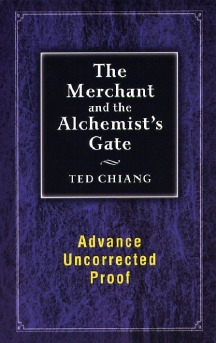
What Would Subterranean Press Do? More than most genres, science fiction encourages the publication of short stories and celebrates the writers who do so. So when Ted Chiang published 'Stories of Your Life and Mine' back in 2005, a lot of readers both in and out of the field sat up and took notice. The Nebula Award-winning author writes the sort of clever yet touching stories that bring back the feel of the Golden Age of Science Fiction, even the work itself is thoroughly modern.
So when I heard that Subterranean Press was going to publish a new anything by Ted Chiang, I made sure to get my hands on a copy as soon as possible. 'The Merchant and the Alchemist's Gate' (Subterranean Press ; July 2007 ; $20) is going to be just about the easiest twenty bucks you've spent on a book in a long, long time. Chiang's new work is every bit as austere, gorgeous and thought-provoking as anything he has ever written.
'The Merchant and the Alchemist's Gate' showcases the deep and pure potential for science fiction literature to operate in the realm of parable. Fuwaad ibn Abbas is a merchant who comes before the Caliph himself to tell a tale. While strolling through the market one day, Abbas comes upon a remarkable stand. Intricate astrolabes compel him to speak to the seller, Bashaarat, who offers to show him something even more interesting, a device that may seem magic but might just as well be a sufficiently advanced technology. It does not matter to either the reader or the teller of the tale. All that matters are the tales that follow.
Chiang then spins three stories; 'The Tale of the Fortunate Rope Maker', 'The Tale of the Weaver Who Stole From Himself' and 'The Tale of the Wife and Her Lover'. In each tale, he trains a fabulist's eye on a classic science-fictional trope with results that transcend any genre. This is in fact Chiang's strength, his ability to extract both the emotional and intellectual essence of the tale. And it is particularly nice here to have the through-line of the various tale-tellers and setting. At 83 pages it offers Chiang the opportunity to work at a greater length than we've seen from him in the past, yet preserves his interest and skills as a short-story writer. There's a purity and clarity at work in these stories that makes them seem easy, yet belies a wealth of work required to create the illusion. Chiang demonstrates that even literature itself can be a technology that, sufficiently advanced, is able to work magic.
Heart Via Fangs
Here’s why you always want to read an author's novels in chronological order: 'A Dirty Job', by Christopher Moore. This novel, which won a Quill Award last year and surely deserved it, though not a "series" novel per se, did indeed resurrect, so to speak, the San Francisco backdrop to Moore's 'Bloodsucking Fiends', which I review today. He told me this during the interview we did last year, when he told me he was working on a sequel to 'Bloodsucking Fiends'.
That sequel, 'You Suck' is now sucking in well-deserved dollars and kudos, even garnering national bestseller status. But it's Christopher Moore, folks, so it’s OK to buy it. Suffice it to say that I wish I'd read 'Bloodsucking Fiends' some eleven and a half years ago. Missing Moore is not a mistake I shall make again. On the other hand I have bit if a back-catalogue to look forward to, which is admittedly always a delight.
If you're planning on reading Moore at all, the best place to start is 'Practical Demonkeeping', his first, which sets the scene for the Pine Cove novels. Next up is 'Coyote Blue', and then 'Bloodsucking Fiends'. Some ten-plus years later, it all pays off. The best authors always make sure that is all pays off.
02-27-07: "The Power of the Edit Is a Mighty, Mighty Thing"
A Preview of 'Brasyl' by Ian McDonald + Bonus Podcast Interview
I had the privilege of meeting Ian McDonald in Glasgow at the 2005 WorldCon, where we talked about his new-at-the-time 'River of Gods'. I'm sure I gave my usual rant about the lack of a US publisher for that outstanding novel, a situation which has since been corrected when Pyr picked it up and published it with a lovely Stephan Mantiniére cover. To die for!
And as well to die for, McDonald's forthcoming 'Brasyl' (Victor Gollancz / Orion Books ; June 2007 ; £18.99 ; Pyr / Prometheus Books ; May 2007 ; $25), which moves his multi-cultural microscope to the South American continent. 'Brasyl' is a triptych, slicing and dicing stories across three very different times and finding the quantum entanglement that unites them beneath reality as we know it. This is certain to be one of the big novels of this year, so you might as well pre-order both versions, because you are a hopelessly compulsive paper addict whose house is bigger on the inside than it is on the outside.
'Brasyl' is a bit shorter than 'River of Gods' and due to its really interesting structure, a bit more readily gulpable by the book-gulping masses. The 384-page novel is divided into 8 sections, each named after a saint of questionable origin; Our Lady of Production Values, for example, Our Lady of Spandex, and Our Lady of the Telenovelas. Each section includes three separate threads that you can bet your bigger-on-the-inside house will eventually connect though at the outset they seem pretty disparate. The production values come into play in the first thread in every section, the story of Marcelina, set in Rio De Janiero in 2006. Marcelina is a pushy TV producer who gets herself sucked into a conspiracy that threatens her very soul -- presuming of course, she has one. Next in each section we fast forward to 2032 and shift to São Paulo, where a gent with the iconic / unfortunate name of Edison who happens into the world of illegal quantum computing discovers that this has not made his life better and more predictable. And the final portion of each section ratchets back to 1732, where Father Luis is sent back into the jungle to extract a priest who has gone Kurtz and set himself up a nice little empire.
McDonald is clearly one of our premiere science fiction writers and he's pretty much staking out the multi-cultural SF niche as his. And even if 'Brasyl' is a bit shorter and more easily grokable than 'River of Gods', have no fear that it delivers the same sort of combination knockout punch, stunning the reader with the ferocity of the writing and the strangeness of both the culture and the future, and in this case, the past, that McDonald imagines. Line up for it, and plan on seeing it on some genre fiction ballots. You'll be asked to vote for it, so you might as well experience it sooner rather than later. Come to think of it, the same is true of the future.
Since we are working on a future, present and past theme here, I decided to poke through the audio archives and unearth my 2005 interview with Ian McDonald, conducted in his hotel room in Glasgow. He talks about 'River of Gods' and 'Brasyl', as well as revealing his thoughts on the future of art. You can download the MP3 here, or the RealAudio here. This is just a shortish interview, but nonetheless, I feel it reveals just what a major science fiction talent McDonald is. Even though he is speaking in the past, he's eerily prescient in his choice of subjects. Past, present, future. Shuffle them about with the passage of time.
02-26-07: A 2007 Interview With Guy Gavriel Kay
"Interesting things happening to interesting people"
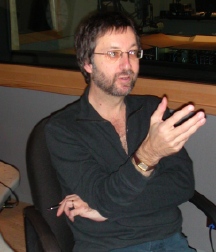
The curse of interesting time. It was only a week ago that I spoke to Guy Gavriel Kay about his new novel 'Ysabel'. Well, we did eventually get to talk about 'Ysabel', once we'd spoken of Kay's unique historically-based fantasy. Kay was a fantastic interview, extremely well-spoken, consistently interesting and surprising. And talk about lucky? Well, you do make your own luck, and Kay was the sort of fellow who managed to end up helping Christopher Tolkien put together 'The Silmarillion' from the notes of the late J. R. R. Tolkien. This is not luck. It's destiny.
Kay and I talked for nearly an hour, and you can download the MP3 here, or the RealAudio here. You'll hear his bid for Bartlett's Quotations: "Interesting things happening to interesting people" is his definition of a good novel. He also talks quite a bit about the vagaries of genre shelving in bookstores, his dislike of genre categories and why he uses the fantastic in his stories. "The use of the fantastic," he told me, "has this wonderful power to universalize a story, make it more relevant for the reader...It's not just about a given time and place. It extracts the themes and ideas of that time and place and shows how they're still with us today, and the fantasy setting is what makes that easier for the author and the reader to have that dialogue about the past and the present." Readers wanting to find out more about Kay are recommended to Bright Weavings, his outstanding official website. Easy to navigate, nicely done. Lots of good stuff there, and worth your valuable time.
We also talked about the two movies based on Kay's work that are in the hopper, one of which, 'The Last Light of the Sun', he is actually writing the screenplay for. He told me how had to be dragged into the project, even though he'd cut his teeth writing for a TV series that dramatized real courtroom cases in Canada. Whether or not these will actually get made is another question, but the prospect of Edward Zwick taking a crack at Kay's historically based fantasy is quite beguiling.
Kay's publisher was kind enough to give me some extra copies of 'Ysabel' to have the author sign so that I could give them away. Email me; on Friday, I'll draw three names, contact the winners and send away the books. You'll be getting one of the most enjoyable, literate and well-written novels you're likely to read this year.
